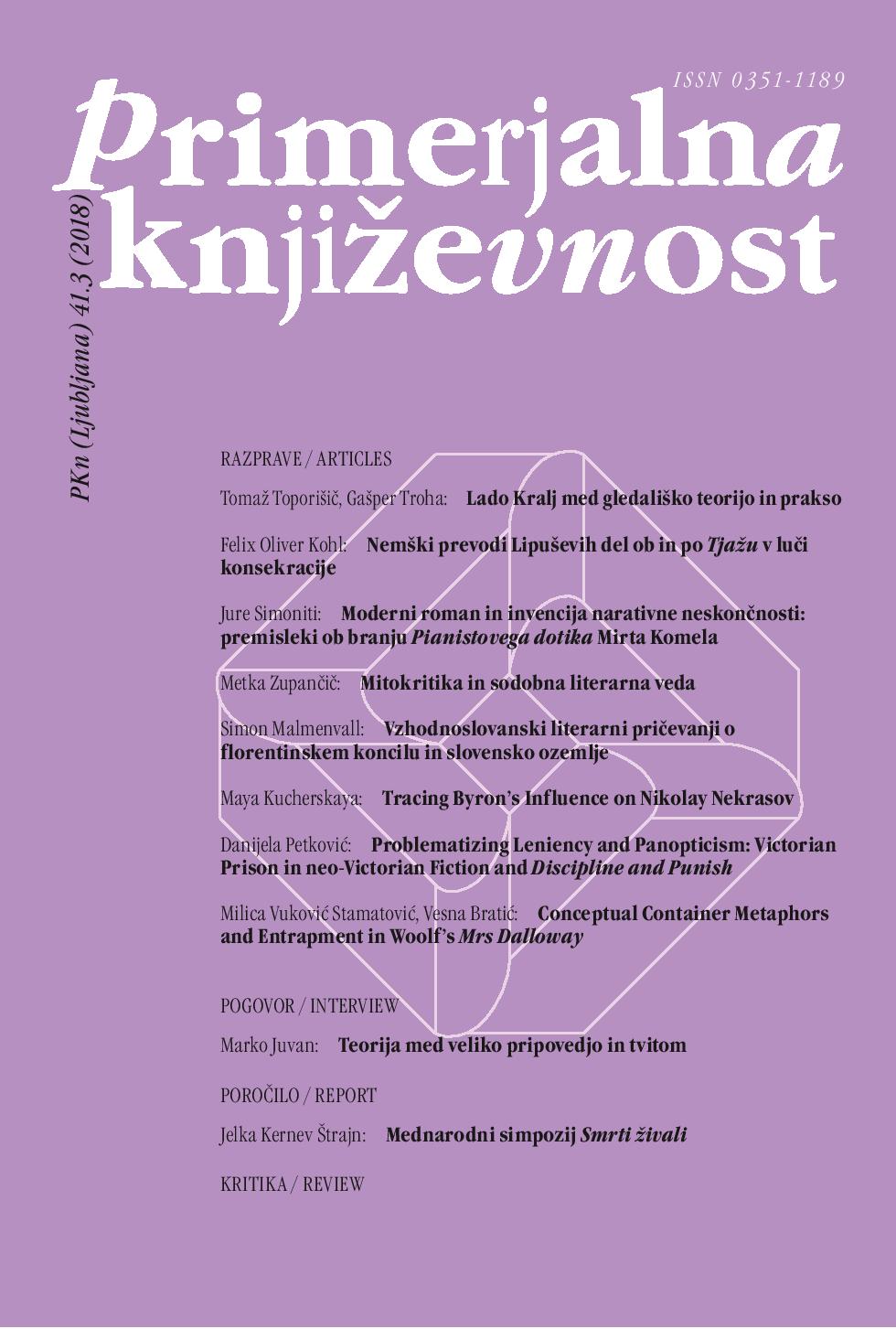Konceptualne metafore vsebovanja in ujetost v Gospe Dalloway Virginie Woolf
Ključne besede:
angleška književnost, Woolf, Virginia, kognitivna teorija metafore, konceptualna metafora, hitra konceptualizacija, zapoznela konceptualizacija, odložena metafora, ujetost, omejenostPovzetek
Članek obravnava konceptualne metafore vsebovanja v romanu Gospa Dalloway Virginie Woolf. Analiza temelji na teoriji konceptualne metafore (Lakoff in Johnson, Metaphors We Live By) in njenih razširjenih različicah, ki so prispevale k proučevanju konceptualne metafore v literarnih besedilih (Werth, Text Worlds in Tsur, »Lakoff’s Roads«). Poudarek je na metaforah vsebovanja, ki nakazujejo ujetost in omejenost, opredeljenih s hitro konceptualizacijo (identifikacija s pomočjo neposrednega konteksta) in njenim zapoznelim dvojnikom (metafore, ki se razkrijejo ob upoštevanju celotnega besedila). Trdiva, da se metafore vsebovanja v romanu združujejo v metaforično mrežo, ki prežema celotno telo romana in definira vse osebe. Ta metaforični podtok pomaga ustvariti vzdušje ujetosti.Literatura
Abbott, H. Porter. “Cognitive Literary Studies: The ‘Second Generation’; The Work of Fiction: Cognition, Culture, and Complexity.” Poetics Today 27.4 (2006): 711–722.
Beer, Gillian. Virginia Woolf: The Common Ground. Edinburgh: Edinburgh University Press, 1996.
Charles, Marilyn. “The Waves: Tensions between Creativity and Containment in the Life and Writings of Virginia Woolf.” The Psychoanalytic Review 91.1 (2004): 71–97.
Fauconnier, Gilles. Mapping in Thought and Language. Cambridge: Cambridge University Press, 1997.
Freeman, Margaret H. “Cognitive Linguistic Approaches to Literary Studies: State of the Art in Cognitive Poetics.” The Oxford Handbook of Cognitive Linguistics. Eds. Irk Geeraerts and Hubert Cuyckens. Oxford: Oxford University Press, 2009. 1175–1202.
Gibbs, Raymond W. The Poetics of Mind: Figurative Thought, Language and Understanding. Cambridge: Cambridge University Press, 1994.
Harbus, Antonina. “Thinking in Metaphors: Figurative Language and Ideas on the Mind.” Sydney Studies in English 30 (2004): 3–20.
Harker, James. “Misperceiving Virginia Woolf.” Journal of Modern Literature 34.2 (2011): 1–21.
Henke, Suzette A. “Mrs Dalloway: The Communion of Saints.” New Feminist Essays on Virginia Woolf. Ed. Jane Marcus. Lincoln: University of Nebraska Press, 1981. 125–147.
Hobbs, Jerry R. Literature and Cognition. Stanford: Centre for the Study of Language and Information (CSLI), 1990.
Kövecses, Zoltán. Emotion Concepts. New York: Springer Science & Business Media, 2012.
– – –. Metaphor in Culture: Universality and Variation. Cambridge: Cambridge University Press, 2005.
Lakoff, George. Women, Fire, and Dangerous Things. Chicago and London: University of Chicago Press, 1987.
Lakoff, George, and Mark Johnson. Metaphors We Live By. Chicago and London: University of Chicago Press, 1980.
– – –. Philosophy in the Flesh: The Embodied Mind and Its Challenge to Western Thought. New York: Basic Books. 1999.
Langacker, Ronald W. Foundation of Cognitive Grammar. Vol. I: Theoretical Prerequisites. Stanford, CA: Stanford University Press, 1987.
McVicker, Jeanette. “Postcolonial Approaches.” Palgrave Advances in Virginia Woolf Studies. Ed. Anna Snaith. Houndmills, Basingstoke, Hampshire: Palgrave Macmillan, 2007. 209–226.
Richardson, Alan and Francis F. Steen. “Literature and the Cognitive Revolution: An Introduction.” Poetics Today 23.1 (2002): 1–8.
Schröder, Leena K. “‘Reflections in a Motor Car’: Virginia Woolf’s Phenomenological Relations of Time and Space.” Locating Woolf: The Politics of Space and Place. Eds. Anna Snaith and Michael H. Whitworth. Houndmills, Basingstoke, Hampshire: Palgrave Macmillan, 2007. 131-147.
Scott, Bonnie King. “The Word Split Its Husk: Woolf’s Double Vision of Modernist Language.” MFS Modern Fiction Studies 34.3 (1988): 371–385.
Semino, Elena, and Gerard Steen. “Metaphor in Literature.” The Cambridge Handbook of Metaphor and Thought. Ed. Raymond Gibbs. Cambridge: Cambridge University Press, 2008. 232–246.
Squier, Susan. “Mirroring and Mothering: Reflections on the Mirror Encounter Metaphor in Virginia Woolf’s Works.” Twentieth Century Literature 27.3 (1981): 272–288.
Taylor, John R. Cognitive Grammar. Oxford: Oxford University Press, 2002.
Tsur, Reuven. “Lakoff’s Roads Not Taken.” Pragmatics and Cognition 7 (1999): 339–359.
– – –. “‘Oceanic’ Dedifferentiation and Poetic Metaphor.” Journal of Pragmatics 12 (1988): 711–724.
Vermorel, Henri, and Madeleine Vermorel, eds. Sigmund Freud et Rolland Romain : correspondance 1923–1936. Paris: Presses Universitaires de France, 1993.
Vorobyova, Olga. “‘The Mark on the Wall’ and Literary Fancy: A Cognitive Sketch.” Cognition and Literary Interpretation in Practice. Eds. Bo Petterson, Merja Polvinen and Harri Veivo. Helsinki: Helsinki University Press, 2005. 201–217.
Werth, Paul. Text Worlds: Representing Conceptual Space in Discourse. London: Longman, 1999.
– – –. “The Linguistics of Double-Vision.” Journal of Literary Semantics 6.1 (1977): 3–28.
Wolf, Werner. “Chance in Fiction as a Privileged Index of Implied Worldviews: A Contribution to the Study of the World-Modelling Functions of Narrative Fiction.” Theorizing Narrativity 12 (2008): 165–210.
Woolf, Virginia. A Writer’s Diary: Being Extracts from the Diary of Virginia Woolf. San Diego: Mariner Book, 2003.
– – –. Collected Novels of Virginia Woolf. Houndmills, Basingstoke, Hampshire: Macmillan, 1992. 165–210.


